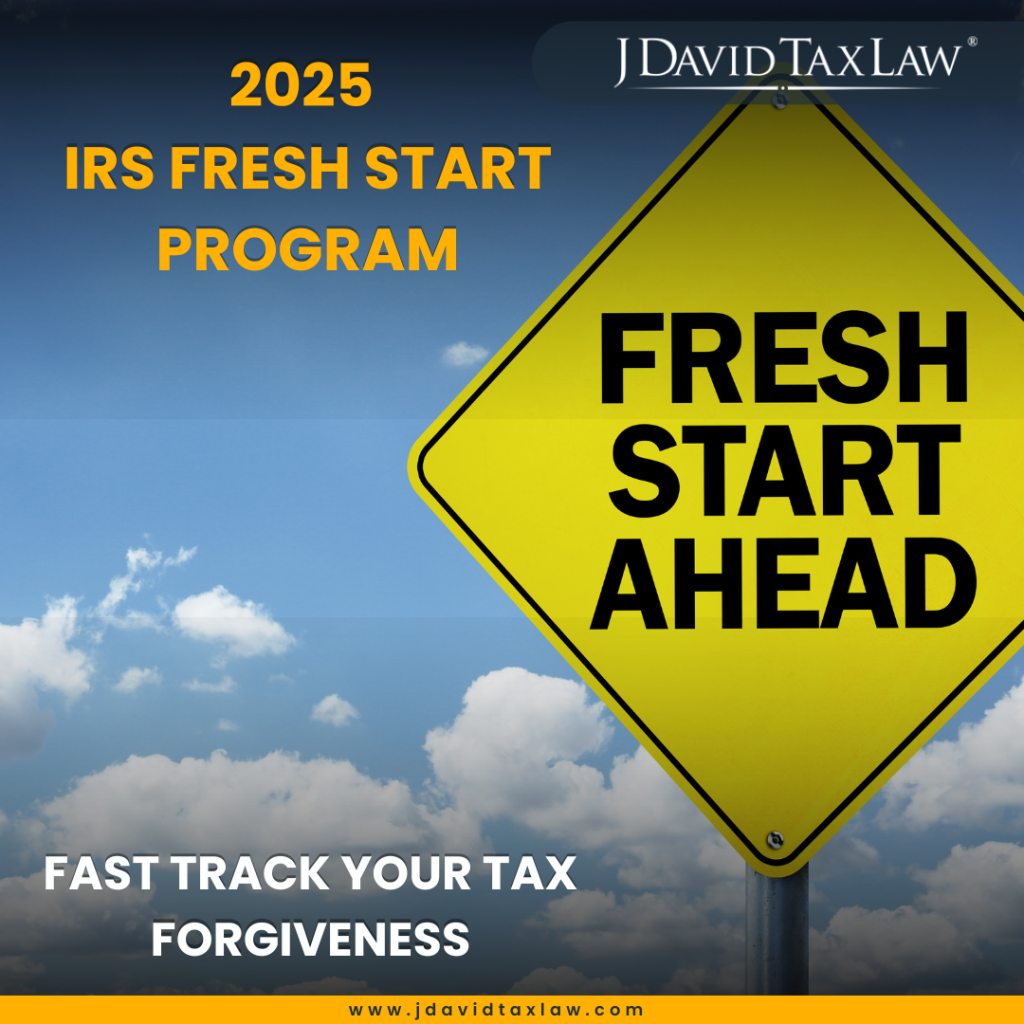If you’re not reviewing your tax situation after the latest law, you could be setting yourself up for a larger IRS bill. The recently enacted One Big Beautiful Bill changes the way federal taxes are calculated for millions of Americans. While some households and businesses may benefit from temporary relief provisions, others could face unexpected increases in their tax liability.
To avoid surprises during tax season, it’s essential to understand how these changes apply to your personal or business finances. The bill introduces new deductions and credits—but many are temporary, income-capped, or offset by new tax rules. Without proper planning, you could lose key benefits or face a higher-than-expected balance due to shifting federal limits or expiring incentives.
Understanding how this new law affects your specific tax obligations is essential, especially if you’re already managing an existing balance or anticipating changes to your refund or liability. At J. David Tax Law, our practice is focused exclusively on resolving IRS and state tax debt. We help individuals and businesses nationwide interpret how tax law changes apply to their situation, evaluate available relief options, and negotiate directly with federal and state agencies.
Key Tax Law Changes All Taxpayers Should Know
The One Big Beautiful Bill introduces a mix of short-term benefits, new taxes, and lasting structural changes. While many of the headline provisions offer relief, others introduce additional liability, reduce prior benefits, or create compliance complexities. Here are the most important tax law changes all taxpayers should be aware of:
1. Permanent Extension of 2017 Individual Tax Cuts
The bill makes permanent the lower marginal income tax rates originally introduced under the Tax Cuts and Jobs Act of 2017. These include retention of the higher standard deduction, continued elimination of personal exemptions, and limitations on itemized deductions. While this extension offers stability for many taxpayers, it does not directly reduce existing IRS balances and may not significantly change net liability when offset by other adjustments.
Key Takeaway:
Your marginal tax rate remains lower, but this does not reduce existing tax debt or prevent future IRS obligations.
2. SALT Deduction Cap Temporarily Raised
For tax years 2025 through 2029, the cap on State and Local Tax (SALT) deductions increases from $10,000 to $40,000 for individuals earning under $500,000. This is a notable benefit for residents of high-tax states, but the change is time-limited and reverts unless extended by future legislation.
Key Takeaway:
Taxpayers in high-tax states may see short-term relief, but this benefit phases out in five years.
3. Temporary Deductions for Specific Income Types
New deductions are introduced for tip income, overtime pay, and auto loan interest (up to $4,000 annually). These are designed to offer relief to middle-income workers but are set to expire after 2028. They are also income-limited and may require documentation to claim.
Key Takeaway:
Middle-income earners may benefit from additional deductions, but these are temporary and limited in scope.
4. Creation of Tax-Deferred “Trump Accounts”
These new savings accounts allow for tax-deferred growth when funds are used for children’s health, education, and essential expenses. While similar to 529 plans in structure, they are limited in scope and subject to annual contribution caps. The provision is also temporary and not guaranteed to continue after 2028.
Key Takeaway:
Parents can now set aside funds for children’s expenses with favorable tax treatment, though annual caps and future expiration apply.
5. Child Tax Credit Adjusted and Indexed to Inflation
The Child Tax Credit (CTC) receives a modest increase of $200 per qualifying child under the One Big Beautiful Bill Act. More notably, the credit is now indexed to inflation, meaning it will automatically adjust upward in future years to reflect changes in the cost of living. This indexing reduces the need for new legislation to update the credit amount annually and helps ensure that its value remains stable over time. However, the refundability provisions of the credit remain unchanged—meaning only a portion of the credit may be refundable depending on a taxpayer’s earned income and tax liability.
Key Takeaway:
Families will see a slightly higher credit now, with automatic increases in future years—but refund eligibility rules stay the same
6. New 1 Percent Tax on Foreign Remittances
The law imposes a 1% federal excise tax on outbound foreign remittances—money transfers sent outside the United States to individuals or institutions abroad. This provision applies broadly to personal and business-related remittances and is assessed at the time of transaction. Although the tax is nominal in percentage terms, it may result in significant added costs for those who make frequent or high-volume transfers, such as individuals supporting family members in other countries or small businesses engaged in cross-border services.
Key Takeaway:
Sending money abroad is now subject to a federal tax, increasing costs for households and businesses with international obligations.
7. Phaseout of Clean Energy Credits
The bill begins a gradual rollback of key energy-related incentives, including credits for electric vehicles and residential solar systems. Taxpayers who had relied on these for refund enhancements or investment decisions may see increased liabilities going forward.
Key Takeaway:
Taxpayers investing in solar or electric vehicles will see shrinking benefits, so timing and planning are now critical.
8. New 40.8 Percent Excise Tax on Litigation Financing Agreements
The OBBB introduces a 40.8% excise tax on litigation financing agreements. Plaintiffs and their attorneys are now required to withhold 20.4% of any payments made to litigation funders, with no grandfathering for pre-existing contracts. Law firms may need to “gross up” payments to meet net contractual obligations, significantly increasing the financial burden on legal practices and clients engaged in financed litigation.
Key Takeaway:
Litigation involving third-party funding will incur new tax obligations, potentially increasing costs for both attorneys and clients.
9. Increase in Qualified Business Income (QBI) Deduction
The bill increases the QBI deduction from 20% to 23% and makes it permanent. This change benefits self-employed individuals and small business owners, potentially reducing their overall taxable income and shaping future tax strategies. For individuals navigating tax debt, the increased deduction may impact their eligibility or calculations for relief programs like Offer in Compromise.
Key Takeaway:
Small business owners and independent contractors may see a meaningful reduction in taxable income moving forward.
Hidden Liabilities Within the One Big Beautiful Bill
While the One Big Beautiful Bill Act includes provisions that extend rate relief and introduce short-term deductions, it also contains several structural elements that could result in higher tax obligations over time—particularly for individuals and small businesses who do not proactively reassess their strategy.
One of the clearest concerns is the temporary nature of many new deductions. Relief for tip income, overtime pay, and auto loan interest only applies through 2028, yet many taxpayers may adjust their withholdings or estimated payments as if those deductions are permanent. When these provisions expire, the result could be a sudden increase in taxable income, potentially triggering a balance due.
The IRS is Forgiving Millions Each Day. You Could Be Next.
Similarly, the gradual elimination of clean energy credits removes a key tool for offsetting tax liability. Taxpayers who previously relied on credits for electric vehicles or solar investments may find that those purchases no longer offer meaningful financial benefit, leading to higher year-end liabilities—even if their income remains unchanged.
The 1% federal excise tax on foreign remittances introduces a new out-of-pocket cost for many households , especially those regularly supporting family members abroad. Because the tax is nondeductible, it adds directly to annual expenses and cannot be offset in return calculations. Over time, this can create a noticeable drain on after-tax income.
Finally, while the bill makes permanent the reduced tax rates and increases the QBI deduction to 23%, these benefits may be outweighed by the loss of other deductions, the return of the SALT deduction cap in 2030, and inflation-driven bracket creep. Without professional review and adjustment, many filers may see a higher effective tax burden, even under a lower nominal rate.
Summary of Key Risk Factors
|
Risk Factor |
Why It Matters |
Who Is Affected |
|
Expiring deductions (post-2028) |
May increase income and withholding shortfalls |
Middle-income workers, hourly employees |
|
Phased-out energy credits |
Reduces refund potential from eco-friendly investments |
Homeowners, small business investors |
|
1% remittance tax |
Adds nondeductible cost to each transaction abroad |
Immigrant families, international supporters |
|
SALT cap returns in 2030 |
Limits state and local tax deductibility again |
High-income earners in high-tax states |
|
Reduced deductions vs. lower rates |
May result in higher overall tax paid despite lower brackets |
Self-employed, upper-middle-income earners |
Tax Debt Risks in the Wake of the New Law
The changes introduced by the One Big Beautiful Bill Act do not only affect future tax planning—they also increase the risk that individuals and businesses may fall into tax debt . As deductions phase out, new taxes take effect, and payment obligations shift, taxpayers who are unprepared may find themselves unable to meet their liabilities in full, triggering collection actions by the IRS or state authorities.
Legal Relief Options Available to Taxpayers
For individuals and businesses facing increased tax liability or active collection efforts due to the One Big Beautiful Bill, there are legal pathways to regain control. The IRS and most state revenue departments offer structured resolution programs, but these programs require accurate documentation, strategic negotiation, and, in many cases, professional representation to secure favorable terms. Navigating this process successfully can mean the difference between ongoing hardship and long-term resolution.
1. Offer in Compromise (OIC)
An Offer in Compromise allows eligible taxpayers to settle their debt with the IRS for less than the full amount owed. Qualification is based on the individual’s ability to pay, income, expenses, and asset equity. The IRS evaluates whether collecting the full balance would cause undue financial hardship or be unlikely over time.
Best suited for:
-
Taxpayers with significant balances and limited income/assets
-
Individuals unable to pay in full without financial harm
Our tax attorneys prepare complete OIC packages, address IRS counterarguments, and negotiate to maximize approval chances, often reducing six-figure debts to a fraction of the original amount.
2. Installment Agreements
For those who do not qualify for OIC, an IRS payment plan may allow full repayment over time without immediate enforcement . Agreements can range from short-term extensions to long-term installment plans based on balance and financial disclosure.
Best suited for:
-
Individuals with steady income who cannot pay in full immediately
-
Taxpayers seeking to stop enforcement and avoid default
J. David Tax Law helps structure affordable terms, prevent penalties for default, and protect clients from wage garnishments while the agreement is in effect. Call (888) 342-9436 to speak with a tax attorney today.
3. Currently Not Collectible (CNC) Status
Taxpayers experiencing financial hardship may be placed into CNC status , temporarily suspending IRS collection efforts due to inability to pay. This does not eliminate the debt but stops enforcement actions like levies and garnishments.
Best suited for:
-
Unemployed individuals
-
Those with minimal income or high medical/living expenses
4. Penalty Abatement
Many tax debts include substantial penalties for failure to file, failure to pay, or underpayment. The IRS may remove or reduce penalties for those who demonstrate reasonable cause or who qualify for First-Time Abatement relief.
Best suited for:
-
Taxpayers facing a large penalty portion relative to the base tax
-
Individuals with clean compliance history or documented hardship
Penalty abatement, when used correctly, can save you thousands. In one case, J. David Tax Law secured over $150,000 in waived penalties and interest after the state initially denied relief three times. By applying the correct procedures and refusing to give up, our team achieved a full abatement for the client.
5. Representation in State Tax Matters
Though the One Big Beautiful Bill affects federal tax law, many clients face parallel state tax issues. Every state has its own resolution process, and coordination between IRS and state responses is critical for comprehensive relief. Our tax attorneys work with revenue departments in all 50 states, handling wage garnishments, lien releases , and settlement negotiations under state-specific laws and procedures.
Now Is the Time to Get Professional Tax Help
As the tax landscape grows more complex under the Bill, the stakes for individuals and business owners have never been higher. In this environment, general financial advice is not enough. Unlike accountants or tax preparers who focus on filing and bookkeeping, tax attorneys are legal advocates trained to represent clients in disputes, negotiate with revenue authorities, and protect assets during collections.
At J. David Tax Law, Our tax lawyers intervene quickly to stop wage garnishments, lift bank levies , or negotiate protective status with the IRS or state authorities. We also develop long-term resolution strategies through programs like Offer in Compromise, Installment Agreements, or Currently Not Collectible status, tailored to each client’s financial reality and legal position.
Frequently Asked Questions
1. What is included in the One Big Beautiful Bill?
2. How will the One Big Beautiful Bill affect my IRS tax bill?
The impact depends on your income level, filing status, and deductions. While some may see modest savings from extended tax cuts or increased deductions, others may lose valuable credits (like clean energy incentives) or face new taxes—resulting in a higher IRS bill. These shifts can also reduce refunds or create unexpected balances due. If you’re unsure whether the new law increases your risk of IRS enforcement, it’s best to consult a tax resolution attorney. At J. David Tax Law, we evaluate your exposure and help protect you from wage garnishments or penalties before they escalate.
3. Who benefits most from the One Big Beautiful Bill?
Taxpayers earning under $500,000 in high-tax states benefit from the higher SALT cap, while small business owners and self-employed professionals may benefit from the expanded QBI deduction. Families with children gain from the Child Tax Credit increase, and workers in tipped or overtime-heavy industries can take advantage of temporary new deductions. However, many of these changes are time-limited and phase out by 2029, requiring careful planning.
4. Does the One Big Beautiful Bill offer any new tax breaks?
Yes, but most are temporary. The bill adds deductions for tips, overtime, and auto loan interest, introduces tax-deferred “Trump Accounts” for children’s expenses, and increases the QBI deduction to 23%. These provisions may lower your tax bill in the short term but could create risk if not planned for properly. Without timely adjustments, these short-lived benefits may result in underpayment or penalties later. Our team can help you take advantage of available relief now—while building a strategy that protects you when those breaks expire.
5. What should I do if I owe more under the new tax law?
If you find yourself facing a larger IRS bill due to the One Big Beautiful Bill, there are several relief options available. You may qualify for an Offer in Compromise (OIC), payment plans, penalty abatement, or temporary collection holds like Currently Not Collectible status. The key is to act quickly, delaying can lead to garnishments, liens, or levies. At J. David Tax Law, we move fast to protect your income and resolve IRS or state tax balances. Call us at (888) 342-9436 for a free consultation and a plan customized to your financial situation.




















